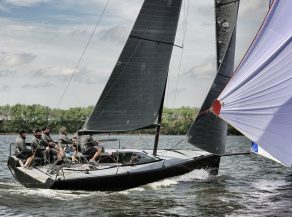HP30 class set for strongest ever season.
20TH JANUARY, 2021
The six year old HP30 class continues to receive resounding endorsements from owners and is now firmly established, having grown every season. A minimum of 15 boats, including high-profile new names, are already lined up to race across 10 events in 2021.
As in previous years there will be two racing series. The main prizes are for the core Championship Series of six events over the summer months. In addition, a Solent Series spans the whole season.
HP30s quickly became known for tantalisingly close racing. There’s plenty of fast and furious action, with competitors often separated by mere seconds right round the course.
Fast and accessible
While the emphasis is firmly on speed, this is not an exotic or inaccessible class, so there are no foils or water ballast and construction materials are tightly controlled. In addition, the class rule tightly defines which designs qualify as an HP30, so speed differentials across the fleet are relatively small. A key strength of the IRC rating system is in identifying these small differences between similar boats, which results in very fair competition, as has also been demonstrated in the Quarter Ton and Fast 40 fleets.
The vision of racing for powerful light displacement boats of similar speed potential has proved enormously attractive to owners who continue to move into the class. They have the added reassurance of a strong owner-managed class association, plus a stable class rule run by the class technical committee with input from the RORC Rating Office.
Long competitive life
HP30 designs therefore have an inherently long competitive life – in the past few seasons boats representing some 25 years of yacht design have notched up regatta wins. The class has also gained international recognition – working groups in Europe, the USA, Japan and Australia are looking to replicate the success of the UK fleet and establish local HP30 racing.
Easy to sail
Despite their speed potential, these boats are refreshingly easy to sail. Anyone who’s raced SB20s, for example, will find an HP30 less physical, drier and more stable, yet they are also a lot faster. Indeed, new owners for 2021 include SB20 supremo Jerry Hill and co-owner Richard Faulkner who have bought Farr 280#5, previously named FOMO and sailed by Lloyd Thornburgh. Other entries for the coming season include three other further Farr280s, five FarEast 28Rs, a Lutra 30, J/90 and McConaghy31.
In addition, two further owners are actively looking for boats for the start of the season, while a Swiss Farr 280, a Dutch FarEast 28R, and a FarEast 31R from Falmouth will join the fleet for the core summer series, including the 2021 national championship.
Despite their speed potential, these boats are refreshingly easy to sail. Anyone who’s raced SB20s, for example, will find an HP30 less physical, drier and more stable, yet they are also a lot faster. Indeed, new owners for 2021 include SB20 supremo Jerry Hill and co-owner Richard Faulkner who have bought Farr 280#5, previously named FOMO and sailed by Lloyd Thornburgh. Other entries for the coming season include three other further Farr280s, five FarEast28Rs, a Lutra30, J/90 and a McConaghy31. In addition, two further owners are actively looking for boats for the start of the season, while a Swiss Farr 280, a Dutch FarEast 28R, and a FarEast 31R from Falmouth will join the fleet for the core summer series, including the 2021 national championship.
So there will be at least fifteen boats lining up to race at some of the larger regattas.
All but one of the existing teams remain in the fleet, with the notable exception of Pegasus Dekmarx, whose owner Malcolm Wootton has retired to France.
Malcolm and his superb team will be genuinely missed, but hopefully, his superbly modified Farr30 will be snapped up by a savvy team, looking to be competitive in 2021. Pegasus is one of a number of eligible boats available for 2021, along with a Lutra30 (priced at only £27,000) and both the FarEast28s and FarEast31s.
For teams wanting to get involved, please email secretary@hp30class.com







